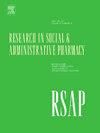为老年人苯二氮卓受体激动剂去处方的医生提供装备:基于BE-SAFE干预的理论发展。
IF 3.7
3区 医学
Q1 PUBLIC, ENVIRONMENTAL & OCCUPATIONAL HEALTH
Research in Social & Administrative Pharmacy
Pub Date : 2025-05-21
DOI:10.1016/j.sapharm.2025.05.002
引用次数: 0
摘要
背景:苯二氮卓受体激动剂(BZRA)仍广泛用于老年人睡眠问题,尽管风险-收益比不利。医院环境为老年人优化药物使用提供了机会。BE-SAFE项目遵循严格的顺序方法,在6个欧洲国家(比利时、希腊、挪威、波兰、西班牙和瑞士)的医院环境中开展了针对BZRA去处方的理论知情干预措施。目的:本文的目的是描述医生干预的发展,对医生的可接受性和感知可行性的结果,以及最终的BE-SAFE干预。方法:干预建立在初步工作的基础上,并分为四个主要步骤:选择行为改变技术;确定现有资源并评估医院医生的需求和偏好;制定干预措施组成部分和提供方式;并对最终用户的干预进行评估和细化。结果:共选择了11种行为改变技术,解决了6个主要障碍,形成了6个组成部分的干预措施:高级医生认可、培训、自我监测、去处方算法、与患者和其他医疗保健专业人员的沟通。这些核心元素的交付将允许当地的适应性。24名医生对干预进行了评估。他们确认,干预措施有效地针对了初步工作中突出的障碍,并就清晰度和时间问题提供了改进反馈。结论:通过系统地以理论知情的方式解决实施问题,开发了一种6成分的医生干预措施,以增强医院环境中发起的BZRA去处方。该干预措施将在多国集群随机对照试验中进行评估。本文章由计算机程序翻译,如有差异,请以英文原文为准。
Equipping physicians for benzodiazepine receptor agonists deprescription in older adults: theory-based development of the BE-SAFE intervention
Background
Benzodiazepine receptor agonists (BZRA) are still widely used for sleep problems in older adults despite an unfavourable risk-benefit ratio. The hospital setting presents an opportunity for optimising medication use in older adults. The BE-SAFE project follows a rigorous sequential approach for developing a theory-informed intervention towards BZRA deprescription initiated in the hospital setting in 6 European countries (Belgium, Greece, Norway, Poland, Spain, and Switzerland).
Objectives
The objectives of this paper are to describe the development of the physicians' intervention, the results of on the acceptability and perceived feasibility with physicians, and the finalised BE-SAFE intervention.
Methods
The intervention was built upon preliminary work and developed in four main steps: selection of behaviour change techniques; identification of existing resources and assessment of needs and preferences of hospital physicians; development of intervention components and modes of delivery; and end-users’ evaluation and refinement of intervention.
Results
A total of 11 behaviour change techniques were selected, addressing 6 main barriers into a 6-component intervention: senior physician endorsement, training, self-monitoring, deprescription algorithm, communication to patients and other healthcare professionals. These core elements will be delivered allowing local adaptability. Twenty-four physicians evaluated the intervention. They confirmed that the intervention effectively targets the barriers highlighted in preliminary work and provided feedback for improvement regarding clarity and time issues.
Conclusions
A 6-component physician's intervention to enhance BZRA deprescription initiated in hospital settings was developed by systematically addressing implementation issues in a theory informed manner. This intervention will be evaluated in a multi-country cluster randomised controlled trial.
求助全文
通过发布文献求助,成功后即可免费获取论文全文。
去求助
来源期刊

Research in Social & Administrative Pharmacy
PUBLIC, ENVIRONMENTAL & OCCUPATIONAL HEALTH-
CiteScore
7.20
自引率
10.30%
发文量
225
审稿时长
47 days
期刊介绍:
Research in Social and Administrative Pharmacy (RSAP) is a quarterly publication featuring original scientific reports and comprehensive review articles in the social and administrative pharmaceutical sciences. Topics of interest include outcomes evaluation of products, programs, or services; pharmacoepidemiology; medication adherence; direct-to-consumer advertising of prescription medications; disease state management; health systems reform; drug marketing; medication distribution systems such as e-prescribing; web-based pharmaceutical/medical services; drug commerce and re-importation; and health professions workforce issues.
 求助内容:
求助内容: 应助结果提醒方式:
应助结果提醒方式:


